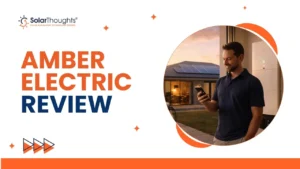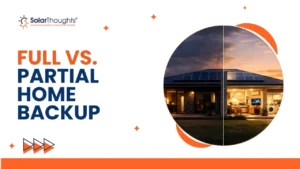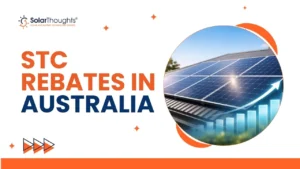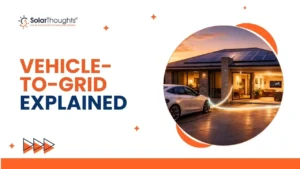The Sofar vs Fox ESS Battery debate has become one of the biggest questions for Australian homeowners investing in solar battery storage. Choosing the right battery can greatly impact your long-term value and energy efficiency.
Table of Contents
ToggleBoth Sofar and Fox ESS batteries deliver excellent performance, but their practical outcomes differ. As more Australians look to cut power bills and secure energy independence, SolarThoughts® helps you make an informed choice.
This detailed comparison explores efficiency, warranty, and real-world value to help you decide which system best suits your needs.
Ease of Installation and Compatibility
Battery system installations like Fox ESS or Sofar can affect your overall costs and satisfaction based on their setup complexity and how well they work with your existing equipment.
AC vs DC Coupling: Which Is Easier?
Fox ESS batteries use DC coupling and need a compatible Fox ESS hybrid inverter to connect the system. DC coupling gives you higher efficiency rates of 96-99% compared to AC coupling’s 90-92%. The system loses less energy during conversion.
DC-coupled systems like Fox ESS are more economical for new installations built from scratch. AC-coupled systems work better to modernize existing solar setups.
Hybrid Inverter Compatibility
Fox ESS has specific requirements to work at its best. Their batteries only work with Fox ESS hybrid and AC-coupled inverters in both single-phase and three-phase options. You can connect 3-7 battery modules with three-phase hybrid (H3) inverters. Single-phase (H1) inverters support 2-6 modules.
The system’s components communicate effectively, and the inverter manages battery charge and discharge cycles to optimize performance.
All-in-One vs Modular Setup
Fox ESS comes in two battery configurations:
1. EQ Series: A modular, stackable system with 4.66kWh per module that scales up to nearly 42kWh in a single stack
2. EP Series: Fixed-capacity wall-mounted batteries that combine modules and battery management in one enclosure
These systems feature plug-and-play installation with built-in fuse protections that reduce labor and installation time. The EP series can expand by adding units in parallel but needs an extra junction box. This makes it costlier than the stackable EQ series.
Retrofit Suitability for Existing Solar Systems
Fox ESS systems merge with existing solar installations based on inverter compatibility and system setup. You have two main options to modernize: replace your current inverter with a hybrid model or add a separate inverter for the battery.
Fox’s AC system (called AC3) works great with existing grid-connected inverter systems that need battery storage. This solution helps if your current system runs well but needs more storage capacity.
User Experience and Reviews
Battery systems’ real-life performance shapes how satisfied users feel, and both Sofar and Fox ESS have received mostly positive feedback from Australian homeowners.
Customer Ratings: Sofar 4.0 vs Fox ESS 3.96
Verified customer reviews show Sofar batteries slightly outperform Fox ESS. Sofar generally receives very positive feedback, while Fox ESS also maintains strong customer satisfaction. These insights point to higher satisfaction with Sofar, even when considering the total reviews.
Monitoring and App Usability
Users love Sofar Solar’s easy-to-use monitoring systems. Many customers like knowing how to track their system’s performance, though some say they “would like a better app to monitor and check on things”. Both companies provide smartphone apps that let homeowners keep an eye on their energy use, generation, and storage from anywhere.
Noise Levels and Esthetics
Both batteries run quietly, but their inverters can make a high-pitched “coil whine” during peak operation. This happens when electricity flows through components at high frequencies, making them vibrate. Fox ESS users sometimes mention that “the inverter gets noisy and very hot to the touch” during maximum production. This is more noticeable when the inverter sits on walls that can increase vibrations. Modern battery systems run at about 20-30 dB, which makes them much quieter than a standard refrigerator (40-50 dB).
Support and Service Availability in Australia
Sofar’s Australian office gives them a big advantage over Fox ESS. Local support makes warranty claims and technical help easier for Sofar users. Fox ESS still struggles with “limited brand recognition and local support among installers” in the Australian market.
Long-Term Ownership Costs
The true value of your battery investment depends on long-term costs that go way beyond the reach of the purchase price.
Warranty Duration and Conditions
Sofar and Fox ESS both give standard 10-year product warranties that are a great way to get peace of mind for your investment. Fox ESS’s warranty ensures your battery keeps at least 70% of its nominal capacity after 6,000 cycles at 90% depth of discharge. The same goes for Sofar, which sticks to the industry-standard 70% minimum capacity retention when the warranty ends. Your battery should keep at least 70% of its original storage capability even after a decade of use.
Warranted Throughput: 3.84 MWh vs 4.1 MWh
The total energy a battery delivers throughout its lifetime represents its warranted throughput. Fox ESS beats the competition with a throughput guarantee of 4.1 to 4.7 MWh per usable kilowatt-hour. Sofar comes in at about 3.84 MWh. Fox ESS delivers 7% more energy during its warranty period, which could mean better value over time.
Battery Degradation Over Time
These lithium batteries lose capacity gradually. You’ll likely have 60-80% of original capacity left after 10 years. Fox ESS batteries last through 6,000+ cycles, which means about 16 years of daily use. Smart management can stretch the cycle life to 9,000-10,000 cycles if you keep the depth of discharge at 60%.
Insurance and Maintenance Considerations
Standard warranties exclude damage from storms, accidents, or wrong installation, whatever brand you choose. So you should add battery coverage to your home insurance policy. These systems need only basic upkeep with occasional firmware updates and health monitoring.
Which One Saves You More Money?
Your choice between these battery systems comes down to which option gives you better value for your money over time.
Cost per Usable kWh: $1,033 vs $889
Fox ESS batteries are a big deal as it means that they offer better upfront value at $889 per usable kWh, while Sofar comes in at $1,033 per usable kWh. You save nearly 14% on your original investment with Fox ESS, making it the clear choice if you want to keep costs down.
Estimated Annual Savings on Flat Tariff
Households using Fox ESS batteries save between $1,070–$2,293 each year on a flat electricity rate, based on their power usage. A typical family using 15kWh daily with a 5.7kWh battery can save around $1,784 in Perth and $2,325 in Brisbane.
Estimated Annual Savings on Time-of-Use Tariff
Time-of-use tariffs boost your savings even more, especially when you have a larger household. A 13.5kWh battery on time-of-use pricing can save you about $2,990 yearly, compared to $1,881 on flat rates. These savings happen because batteries provide power during expensive evening peak times when rates hit 41¢/kWh.
Payback Period Comparison
Fox ESS batteries pay for themselves faster because they cost less upfront. The best scenarios show payback times from 5.0 years in Sydney to 7.1 years in Adelaide for smaller systems. Larger 13.5kWh systems can pay themselves off in just 5.0 years if you use lots of power in the evening.
Best Use Case for Each Battery
Fox ESS batteries work best for homes that use lots of evening power on time-of-use tariffs, especially in WA and NSW where you get extra state rebates. Sofar batteries make more sense if you want Australian-based support or already have Sofar inverters since they’re easier to install together.
Conclusion
The Sofar vs Fox ESS Battery comparison comes down to your priorities. Fox ESS wins on cost per usable kWh ($889 vs $1,033) and higher throughput (4.1–4.7 MWh)—offering superior long-term value and quicker payback. Meanwhile, Sofar shines with better customer satisfaction and strong Australian support, ensuring reliable after-sales service.
If your goal is maximum savings and faster ROI, Fox ESS is the stronger financial choice. But if you already own Sofar equipment or value local support, Sofar remains a safe, hassle-free option.
Looking for Solar Battery Storage in Brisbane? Contact SolarThoughts® today for the best solar battery storage quotes and expert installation.
Disclaimer:
All prices, savings estimates, and performance data mentioned are based on available market information on the internet. Actual costs, rebates, and energy savings may vary depending on your location, energy usage, and installation conditions. Please consult SolarThoughts® for a personalised assessment and updated pricing.






